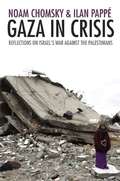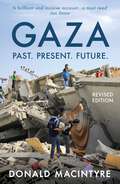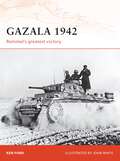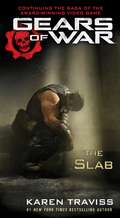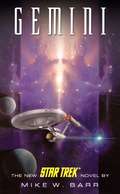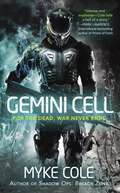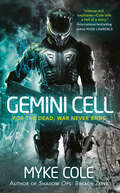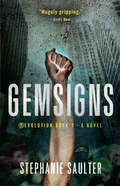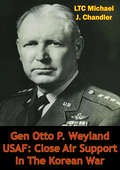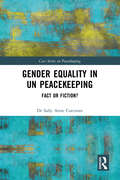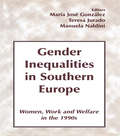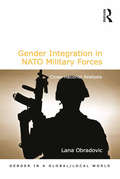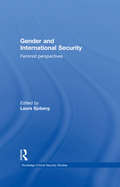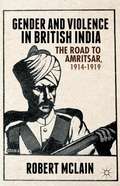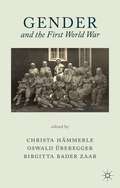- Table View
- List View
Gaza Writes Back
by Refaat Alareer"Gaza Writes Back" is a collection of short stories from fifteen young writers in Gaza, members of a generation that has suffered immensely under Israel's siege and blockade. Their experiences, especially during and following Israel's 2008-2009 offensive known as Operation Cast Lead have fundamentally impacted their lives and their writing. Indeed, many of these writers saw the war as a catalyst for their writing, as they sought an outlet and a voice in its aftermath. They view the book as a means of preserving Palestinian memories and presenting their narratives to the world without filters. Their words take us into the homes and hearts of moms, dads, students, children, and elders striving to live lives of dignity, compassion, and meaning in one of the world's most embattled communities. These stories are acts of resistance and defiance, proclaiming the endurance of Palestinians and the continuing resilience and creativity of their culture in the face of ongoing obstacles and attempts to silence them. Whether tackling the tragedy that surrounds missile strikes and home raids, or the everyday indignities encountered by Palestinian refugees, Gaza Writes Back brings to life the real issues that the people of Gaza face. One prominent theme in many of the stories is the wisdom of parents and grandparents. A sense of longing pervades the book, as the characters in the stories reveal desires ranging from the mundane to the complex--including, in several of the stories, a strong yearning to return to the characters' family homes and properties after many decades in exile. Social differences within Gaza are also sensitively explored. Readers will be moved by the struggles big and small that emerge from the well-crafted writing, and by the hope and courage that radiates from the authors' biographies. Five years after Operation Cast Lead, these stories remind us that the pain lingers on and the people of Gaza will be forever scarred by the attack. Yet, the call for justice remains persistent, and these young Gazan writers refuse to let the world forget about them--their land, their people, and their story.
Gaza in Crisis: Reflections on Israel's War Against the Palestinians
by Noam Chomsky Ilan PappeIsrael's Operation Cast Lead was described by a UN fact-finding mission ("the Goldstone report") as "a deliberately disproportionate attack designed to punish, humiliate and terrorize a civilian population." The winter 2008-09 assault claimed the lives of 1,400 Palestinians and thrust the crisis in Gaza into the center of the debate about the Israel/Palestine conflict.
Gaza: Preparing for Dawn
by Donald MacintyreUniquely imprisoned, most Palestinians in Gaza cannot travel beyond the confines of the Strip, and in times of war escape is impossible. They live under siege – economic and armed – and yet so many remain courageous, outspoken and steadfast. Donald Macintyre lays bare Gaza&’s human tragedy and reveals how it became a crucible of conflict and a byword for suffering. He identifies the repeated failings – including those of the international community – that have seen countless opportunities for peace pass by. Yet, against all odds, hope for a better future lingers. Gaza was once a flourishing coastal civilization open to the world. Could it be so again?
Gazala 1942: Rommel's Greatest Victory
by John White Ken FordGazala was Rommel's greatest victory. After a period of stalemate in the desert war, during which both the British Eighth Army and the Afrika Korps had rested and regrouped, he carried out a daring flanking movement around the strong Allied defensive position. The British command could not match Rommel's masterly co-ordination of armor, artillery and infantry, even when encircled in an area that became known as "the Cauldron", and his outstanding generalship and a timely break-through by his Italian troops enabled him to win a clear victory after 16 days of fierce fighting. However, although the strategically important town of Tobruk quickly fell, Gazala was actually a high-water mark and failure to break the British at Alam Halfa two months later was followed by defeat for the over-extended Afrika Korps by the greatly strengthened Eighth Army at El Alamein. In this important addition to the Campaign series' coverage of the North African desert war, regular contributor Ken Ford vividly portrays the "Desert Fox" at the height of his powers.
Gears of War: The Slab
by Karen TravissMARCUS FENIX. WAR HERO. LOYAL SON. TRAITOR. Ten years after Emergence Day, as the Locust Horde advances on humanity's last defended area--Ephyra--in a bloody war that has seen billions die, Marcus Fenix does the unthinkable: he defies orders and abandons his post during a critical battle in a bid to rescue his father, weapons scientist Adam Fenix. But Adam is buried in the rubble during a ferocious assault on the Fenix mansion, and Ephyra falls to the enemy. Marcus, grieving for a father everyone believes is dead, is court-martialed for dereliction of duty and sentenced to forty years in the Coalition of Ordered Government's brutal maximum security prison, known simply as the Slab. But Adam is very much alive, snatched from the destruction by the elite Onyx Guard on Chairman Richard Prescott's orders. He's now a long way from home and in a prison of his own--a COG doomsday bunker on the tropical island of Azura, a place hidden from the rest of Sera since the Pendulum Wars. His own guilty secret has been exposed: Adam knew the Locust existed deep below the surface of Sera long before Emergence Day, and were being driven from their tunnels by a lethal parasite known as the Lambent. Now he has to find a way to destroy the Lambent while the dwindling COG forces fight to hold back a growing Locust army that's threatening to overrun the city. As Adam struggles to find redemption in his comfortable island jail, Marcus seeks his own atonement in the squalid, closed world within the Slab's granite walls. While Dom Santiago and Anya Stroud fight to get him released, ready to make any sacrifice to free him, Marcus gradually finds unexpected kinship among Sera's most dangerous criminals--and a way to carry on his personal war against the Locust. "Adam, you knew this day would come." It was a familiar voice: silky, imperial, polished, and utterly human. "Hello, Myrrah." Adam Fenix found himself thinking of the terrible Locust food again. "You got my message, then." "And how right you were. We do need you. And we shall take you. I hope you're not planning anything foolish. You have responsibilities, Adam." It would be a living death. The Locust Queen would never release him, even if he developed a countermeasure. But he didn't deserve any better. "I also have my service pistol." "And I can take your son at any time." He had the measure of her, then, and she had his. "You leave Marcus out of this. It's a condition." He opened the desk drawer and took out the handgun, a 9mm officer's weapon. It made a distinctive clunk on the wooden desktop as he slammed it down. "If anything happens to him, I don't care what happens to the rest of Sera."
Gears of War: The Slab
by Karen TravissMARCUS FENIX. WAR HERO. LOYAL SON. TRAITOR. Ten years after Emergence Day, as the Locust Horde advances on humanity's last defended area--Ephyra--in a bloody war that has seen billions die, Marcus Fenix does the unthinkable: he defies orders and abandons his post during a critical battle in a bid to rescue his father, weapons scientist Adam Fenix. But Adam is buried in the rubble during a ferocious assault on the Fenix mansion, and Ephyra falls to the enemy. Marcus, grieving for a father everyone believes is dead, is court-martialed for dereliction of duty and sentenced to forty years in the Coalition of Ordered Government's brutal maximum security prison, known simply as the Slab. But Adam is very much alive, snatched from the destruction by the elite Onyx Guard on Chairman Richard Prescott's orders. He's now a long way from home and in a prison of his own--a COG doomsday bunker on the tropical island of Azura, a place hidden from the rest of Sera since the Pendulum Wars. His own guilty secret has been exposed: Adam knew the Locust existed deep below the surface of Sera long before Emergence Day, and were being driven from their tunnels by a lethal parasite known as the Lambent. Now he has to find a way to destroy the Lambent while the dwindling COG forces fight to hold back a growing Locust army that's threatening to overrun the city. As Adam struggles to find redemption in his comfortable island jail, Marcus seeks his own atonement in the squalid, closed world within the Slab's granite walls. While Dom Santiago and Anya Stroud fight to get him released, ready to make any sacrifice to free him, Marcus gradually finds unexpected kinship among Sera's most dangerous criminals--and a way to carry on his personal war against the Locust. "Adam, you knew this day would come." It was a familiar voice: silky, imperial, polished, and utterly human. "Hello, Myrrah." Adam Fenix found himself thinking of the terrible Locust food again. "You got my message, then." "And how right you were. We do need you. And we shall take you. I hope you're not planning anything foolish. You have responsibilities, Adam." It would be a living death. The Locust Queen would never release him, even if he developed a countermeasure. But he didn't deserve any better. "I also have my service pistol." "And I can take your son at any time." He had the measure of her, then, and she had his. "You leave Marcus out of this. It's a condition." He opened the desk drawer and took out the handgun, a 9mm officer's weapon. It made a distinctive clunk on the wooden desktop as he slammed it down. "If anything happens to him, I don't care what happens to the rest of Sera."
Gebirgsjäger
by Darko Pavlovic Gordon WilliamsonFew branches of the German armed forces were represented on so many fronts as the mountain infantrymen, or Gebirgstruppen. From the Blitzkrieg campaigns of 1940, through the invasions of the Balkans and Russia and the North African campaign, to the defence of the Reich 1944-45, the Gebirgsjäger earned a reputation for reliability and courage. Typically each trooper was a supremely fit individual: the need to cover difficult terrain in full kit, without the back-up of a motorised baggage train, demanded this. This new volume examines the recruitment, training, and combat experiences of the common Gebirgsjäger.
Gebirgsjäger: German Mountain Troops, 1935–1945
by Jean-Denis LepageA concise history of the Gebirgsjäger’s employment, which saw them in action on every front, from Lapland in the North to Tunisia in the south, and throught the war, from the invasion of Poland to the final defense of Germany. The Gebirgsjäger were officially formed in 1935 following Hitler’s rejection of the Treaty of Versailles, although the required skills had been fostered in preparation through civilian climbing clubs. They were recruited predominantly from the southern mountainous parts of Germany – Wurtemburg and Bavaria – and from Austria, where Alpinism and mountain warfare had a long tradition. Rigorously trained in skiing, climbing and other demanding skills of mountain survival and combat, they formed an elite within the German army, distinguished by the distinctive Eidelweiss cap badge adopted in 1939. Jean-Denis Lepage gives a concise history of the Gebirgsjäger’s employment, which saw them in action on every front, from Lapland in the North to Tunisia in the south, and throught the war, from the invasion of Poland to the final defense of Germany. He then gives a detailed description of their uniforms and insignia, equipment, organization, training and tactics. The book is clearly illustrated throughout with over 170 of the author’s own line drawings.
Gelegenheit macht Kriege: Sonden im Militär
by Lutz UnterseherGeleitet von einer verbreiteten Vermutung wird danach gefragt, ob die relative Schwäche eines Gegners oder die Wahrnehmung besonderer Verwundbarkeit des jeweiligen Kontrahenten, also von günstigen Gelegenheiten für einen Angriff, tatsächlich den Ausbruch von offenen Feindseligkeiten wahrscheinlicher macht.
Gemini
by Mike W. BarrCaptain James T. Kirk and the Starship Enterprise have been sent to the planet Nador to participate in a watershed event: the Nadorians' first true election, to vote on whether or not to join the United Federation of Planets. Supporting the Federation are the planet's joint rulers: Their Serene Highnesses Abon and Delor, Siamese twins joined at the spinal cord to represent the unity of the different tribes of Nador. But a shadowy group of fanatics wants nothing to do with the Federation, and will stop at nothing -- whether it be assassinating the princes or kidnapping Captain Kirk's nephew Peter -- to achieve their goals! Kirk must work to stop the fanatics from wreaking havoc on Nador, and from harming his beloved nephew -- but even he may be hard-pressed to stem the tide of chaos when the princes' horrible secret is revealed!
Gemini
by Mike W. BarrCaptain James T. Kirk and the Starship Enterprise have been sent to the planet Nador to participate in a watershed event: the Nadorians' first true election, to vote on whether or not to join the United Federation of Planets. Supporting the Federation are the planet's joint rulers: Their Serene Highnesses Abon and Delor, Siamese twins joined at the spinal cord to represent the unity of the different tribes of Nador. But a shadowy group of fanatics wants nothing to do with the Federation, and will stop at nothing -- whether it be assassinating the princes or kidnapping Captain Kirk's nephew Peter -- to achieve their goals! Kirk must work to stop the fanatics from wreaking havoc on Nador, and from harming his beloved nephew -- but even he may be hard-pressed to stem the tide of chaos when the princes' horrible secret is revealed!
Gemini Cell
by Myke ColeMyke Cole continues to blow the military fantasy genre wide open with an all-new epic adventure in his highly acclaimed Shadow Ops universe--set in the early days of the Great Reawakening, when magic first returns to the world and order begins to unravel... US Navy SEAL Jim Schweitzer is a consummate professional, a fierce warrior, and a hard man to kill. But when he sees something he was never meant to see on a covert mission gone bad, he finds himself--and his family--in the crosshairs. Nothing means more to Jim than protecting his loved ones, but when the enemy brings the battle to his front door, he is overwhelmed and taken down. That should be the end of the story. But Jim is raised from the dead by a sorcerer and recruited by a top secret unit dabbling in the occult, known only as the Gemini Cell. With powers he doesn't understand, Jim is called back to duty--as the ultimate warrior. As he wrestles with a literal inner demon, Jim realizes his new superiors are determined to use him for their own ends and keep him in the dark--especially about the fates of his wife and son...
Gemini Cell
by Myke ColeMyke Cole continues to blow the military fantasy genre wide open with an all-new epic adventure in his highly acclaimed Shadow Ops universe--set in the early days of the Great Reawakening, when magic first returns to the world and order begins to unravel... US Navy SEAL Jim Schweitzer is a consummate professional, a fierce warrior, and a hard man to kill. But when he sees something he was never meant to see on a covert mission gone bad, he finds himself--and his family--in the crosshairs. Nothing means more to Jim than protecting his loved ones, but when the enemy brings the battle to his front door, he is overwhelmed and taken down.That should be the end of the story. But Jim is raised from the dead by a sorcerer and recruited by a top secret unit dabbling in the occult, known only as the Gemini Cell. With powers he doesn't understand, Jim is called back to duty--as the ultimate warrior. As he wrestles with a literal inner demon, Jim realizes his new superiors are determined to use him for their own ends and keep him in the dark--especially about the fates of his wife and son...
Gemsigns
by Stephanie SaulterStarburst magazine raved that Gemsigns, the first novel in a series, is "a fascinating and compelling read, exploring the boundaries of human behavior, religious influences, and the morality of the everyday person. It comes highly recommended." For years the human race was under attack from a deadly Syndrome, but when a cure was found - in the form of genetically engineered human beings, Gems--the line between survival and ethics was radically altered. Now the Gems are fighting for their freedom, from the oppression of the companies that created them, and against the Norms who see them as slaves. And a conference at which Dr Eli Walker has been commissioned to present his findings on the Gems is the key to that freedom. But with the Gemtech companies fighting to keep the Gems enslaved, and the horrifying godgangs determined to rid the earth of these 'unholy' creations, the Gems are up against forces that may just be too powerful to oppose.
Gemworld
by John VornholtDazzling to behold, Gemworld is one of the wonders of the Federation: an artificial world composed entirely of crystal, its atmosphere held in place by a sophisticated network of force fields. Home to a half dozen different sentient races, this singular world is a low-gravity playpen of mammoth spires, endless fractal staircases, gemstone arcs, and dazzling prisms, oil carefully nurtured by the planet's many inhabitants -- until now. Lieutenant Melora Pozlor, who previously served on Deep Space Nine , is currently stationed aboard the Starship Enterprise where an urgent telepathic summons alerts her to the danger threatening her homeworld. The crystals that once sheltered her people, and several other alien species, are now growing at a vastly accelerated and uncontrollable rate, wreaking havoc throughout the planet. Captain Picard orders the Enterprise on a rescue mission to Gemworld, but they arrive to find a world in chaos -- and an unexpected menace that traps the crew of the Enterprise along with the fragile civilization they hoped to save!
Gemworld: A Desperate Quest on a Planet in Turmoil
by John VornholtSparkling like a three-dimensional snowflake in the depths of space, Gernworld once was one of the Federation's greatest marvels. Six different alien races coexisted peacefully on an artificial world composed entirely of crystal -- until the very substance of Gemworld began to multiply out of control, tearing the world apart. Now the entire planet -- and the Starship Enterprise as well-faces total destruction. The only way to stop the disaster is to turn off the vast network of force fields holding Gemworld's atmosphere in place, but to do so will require the cooperation of each of the planet's half dozen alien civilizations, one of which sabotaged Gemworld in the first place. With time running out, Captain Picard and his crew, including a lovestruck Lieutenant Barclay, must embark on a hazardous trek across the dying planet to find and unite the chief engineers from many strange and exotic races -- while watching out for a mass murderer determined to destroy a world!
Gen Otto P. Weyland USAF: Close Air Support In The Korean War
by LTC Michael J. ChandlerThis study analyzes Gen O. P. Weyland's impact on close air support (CAS) during the Korean War. First, the author briefly traces the history and evolution of air-ground support from its infancy to the start of the Korean War. Second, he shifts his focus to the effectiveness of CAS throughout the conflict and addresses why this mission was controversial for the Army and Air Force. Third, he highlights General Weyland's perspective on tactical airpower and his role in the close-air-support "controversy." Throughout his career, Weyland was a staunch advocate of tactical airpower. As Patton's Airman in World War II, Far East Air Force commander in Korea, and the commander of Tactical Air Command in the mid-1950s, Weyland helped the tactical air community to carve out its role as a critical instrument of national power.
Gen. John Glover and his Marblehead Regiment in the Revolutionary War: A Paper Read Before the Marblehead Historical Society, May 14, 1903
by C. H. B. Quennell Nathan P. SanbornIn Marblehead for thirty years, and more, after the Revolutionary War, the familiar forms of the veterans of that hard and long continued struggle were seen walking back and forth at the heads of the wharves, on Irving’s Hill, or at the street corners, and the story they told of battles fought, of marches and of camp life was as familiar, throughout the town, to old and young, as any household words. But it was so evenly matched with the scenes of every day life, the hazards and storms at sea, of spars carried away and anchors lost and the vessel on beam-ends, of sailing to the Banks and never returning, that the two stories blended into one, and each life as a whole was a life of adventure, toil and danger; and rarely was a careful record made of passing events; so that many a story of real life, more thrilling than that of any fiction, has been forgotten and lost. When, about two years ago the Bronx Chapter of The Daughters of the American Revolution of Mount Vernon, N. Y., placed a bronze tablet on “Glover’s Rock,” many asked: “Where is Glover’s Rock? and what does it mean?” and were surprised to learn that it marked the spot where General Glover met the enemy, more than five times his number, and fought one of the most skilful and successful battles of the war. This aroused a long cherished wish of the author to follow General Glover and his regiment through the war of the Revolution. Under that inspiration the following paper was prepared and presented to the Marblehead Historical Society, May 14, 1903.
Gender Equality in UN Peacekeeping: Fact or Fiction? (ISSN)
by Sally Anne CorcoranThis book investigates to what extent UNSCR 1325/WPS agenda has functioned in practice, to advance women’s equality and empowerment in the peacekeeping context and beyond.The book examines whether widespread implementation of UNSCR 1325 and the broader WPS agenda via gender mainstreaming in UN operations has translated into increased gender equality in peacekeeping operations, the broader UN institutional context and, by extension, the host countries in which missions are situated, via norm dissemination. The book investigates this via a review of the implementation of UNSCR1325 in the operations chosen as research sites over three snapshot years. The book undertakes a comparative analysis that scrutinizes if, how and under what conditions gender mainstreaming has succeeded as a strategy to advance gender equality by analyzing the factors/conditions that have led to successful gender mainstreaming across the operational context, and those that have impeded this outcome. The book concludes that, despite rhetorical commitments to women’s equality in peacekeeping since the passage of UNSCR 1325, progress on the ground has remained minimal, and that the operational environment continues to be discriminatory against women. Both quantitatively and qualitatively, women do not participate as equal partners in peacekeeping and continue to have less access to resources and decision-making power, overall. The book interrogates that by exploring the spaces available within law, policy and practice of the UN to pursue the human rights agenda of gender equality and considers whether UNSCR 1325 has enlarged those spaces. It also points to the irony of internal UN structures failing to adequately adapt to their own gender mainstreaming mandates, while those same structures have delivered some gender equality mandates successes externally, at local levels.This book will be of interest to students of peacekeeping, gender studies, and International Relations.
Gender Inequalities in Southern Europe: Woman, Work and Welfare in the 1990s
by Manuela Naldini María José González Teresa JuradoPresenting studies of the situation on gender inequalities and associated pattern of work and welfare in all southern European countries, this work focuses on the interaction of the three major societal institutions - the State, the family and the labour market.
Gender Integration in NATO Military Forces: Cross-national Analysis (Gender in a Global/Local World)
by Lana ObradovicNumerous states have passed gender integration legislation permanently admitting women into their military forces. As a result, states have dramatically increased women’s numbers, and improved gender equality by removing a number of restrictions. Yet despite changes and initiatives on both domestic and international levels to integrate gender perspectives into the military, not all states have improved to the same extent. Some have successfully promoted gender integration in the ranks by erasing all forms of discrimination, but others continue to impede it by setting limitations on equal access to careers, combat, and ranks. Why do states abandon their policies of exclusion and promote gender integration in a way that women’s military participation becomes an integral part of military force? By examining twenty-four NATO member states, this book argues that civilian policymakers and military leadership no longer surrender to parochial gendered division of the roles, but rather support integration to meet the recruitment numbers due to military modernization, professionalization and technological advancements. Moreover, it proposes that increased pressure by the United Nations to integrate gender into security and NATO seeking standardization and consistency on the international level, and women’s movements on the domestic level, are contributing to greater gender integration in the military.
Gender and International Security: Feminist Perspectives (Routledge Critical Security Studies #17)
by Laura SjobergThis book defines the relationship between gender and international security, analyzing and critiquing international security theory and practice from a gendered perspective. Gender issues have an important place in the international security landscape, but have been neglected both in the theory and practice of international security. The passage and implementation of UN Security Council Resolution 1325 (on Security Council operations), the integration of gender concerns into peacekeeping, the management of refugees, post-conflict disarmament and reintegration and protection for non-combatants in times of war shows the increasing importance of gender sensitivity for actors on all fronts in global security. This book aims to improve the quality and quantity of conversations between feminist security studies and security studies more generally, in order to demonstrate the importance of gender analysis to the study of international security, and to expand the feminist research program in Security Studies. The chapters included in this book not only challenge the assumed irrelevance of gender, they argue that gender is not a subsection of security studies to be compartmentalized or briefly considered as a side issue. Rather, the contributors argue that gender is conceptually, empirically, and normatively essential to studying international security. They do so by critiquing and reconstructing key concepts of and theories in international security, by looking for the increasingly complex roles women play as security actors, and by looking at various contemporary security issues through gendered lenses. Together, these chapters make the case that accurate, rigorous, and ethical scholarship of international security cannot be produced without taking account of women's presence in or the gendering of world politics. This book will be of interest to all students of critical security studies, gender studies and International Relations in general. Laura Sjoberg is Assistant Professor of Political Science at the University of Florida. She has a Phd in International Relations and Gender Studies from the University of Southern California and is the author of Gender, Justice, and the Wars in Iraq (2006) and, with Caron Gentry, Mothers, Monsters, Whores: Women's Violence in Global Politics (2007)
Gender and Violence in British India
by Robert MclainIn British India, the years during and following World War I saw imperial unity deteriorate into a bitter dispute over "native" effeminacy and India's postwar fitness for self-rule. This study demonstrates that increasingly ferocious dispute culminated in the actual physical violence of the Amritsar Massacre of 1919.
Gender and the English Revolution
by Ann HughesIn this fascinating and unique study, Ann Hughes examines how the experience of civil war in seventeenth-century England affected the roles of women and men in politics and society; and how conventional concepts of masculinity and femininity were called into question by the war and the trial and execution of an anointed King. Ann Hughes combines discussion of the activities of women in the religious and political upheavals of the revolution, with a pioneering analysis of how male political identities were fractured by civil war. Traditional parallels and analogies between marriage, the family and the state were shaken, and rival understandings of sexuality, manliness, effeminacy and womanliness were deployed in political debate. In a historiography dominated by military or political approaches, Gender and the English Revolution reveals the importance of gender in understanding the events in England during the 1640s and 1650s. It will be an essential resource for anyone interested in women’s history, feminism, gender or British History.
Gender and the First World War
by Christa Hämmerle Oswald Überegger Birgitta Bader ZaarThe First World War cannot be sufficiently documented and understood without considering the analytical category of gender. This exciting volume examines key issues in this area, including the 'home front' and battlefront, violence, pacifism, citizenship and emphasizes the relevance of gender within the expanding field of First World War Studies.

